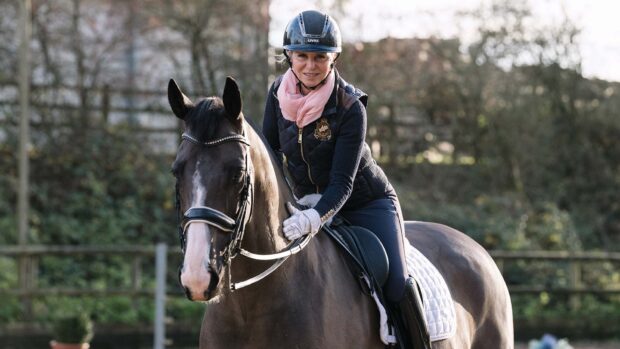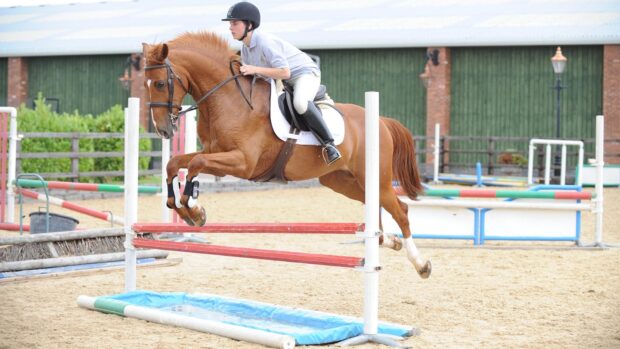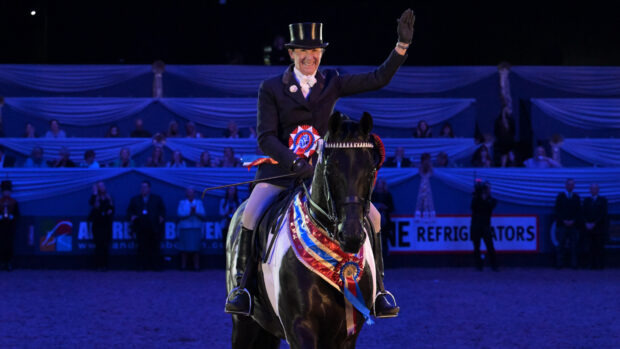Top riders often talk about developing their own system, but modest Irish dressage rider Abi Lyle says she’s “still figuring this out”.
“I don’t know how much of a style of my own I have yet. I’m obviously heavily influenced by Carl (Hester) and Gareth (Hughes) , but I’m also influenced by being Irish in that I love jumping and doing a bit of everything,” she says.
Perhaps surprisingly for an Olympic rider, it’s not competition that motivates Abi.
“It’s not that I’m not grateful for the success I’ve had competing, but I just really love working with horses, training them and being with them,” she explains.
Abi Lyle is more interested in training horses, and building a partnership with them, than competing. Credit: Peter Nixon
“I loved the covid lockdown, I thrived so much. For some reason if I couldn’t compete it wouldn’t bother me… I enjoy it when I compete, but it’s not where my motivation lies,” she explains.
“Some people might say I’m not a great sportsperson for that reason, but I think it’s a good mindset to have as an equestrian. I’m more interested in partnership and longevity with horses, than scores.”
What does Abi Lyle look for in a horse?
{"content":"PHA+4oCcSSBkb27igJl0IHJlYWxseSBoYXZlIGEgc2V0IOKAmHNvbWV0aGluZ+KAmSBJIGxvb2sgZm9yLCBhbmQgYW55IGhvcnNlcyBJIHJpZGUgaGF2ZSBjb21lIHRvIG1lLiBCdXQgSSB3YW50IGhvcnNlcyB0aGF0IHNlZW0gbGlrZSB0aGV5IHdhbnQgdG8gZG8gaXQ7IHRoZXkgbG9vayBoYXBweSB0byBiZSB0YWNrZWQgdXAsIGFuZCBpbnRlcmFjdCB3aXRoIG1lLOKAnSBzaGUgc2F5cywgYWRkaW5nIHRoYXQgYSBnb29kIHRlbXBlcmFtZW50IGlzIGtleS48L3A+Cgo8cD7igJxJIGxpa2UgdG8gZmlndXJlIHRoZW0gYWxsIG91dCBhbmQgSSBsaWtlIHRvIHdvcmsgb3V0IHdoYXQgdGhleSBuZWVkIGluIHRlcm1zIG9mIHRoZWlyIHBlcnNvbmFsaXR5LiBJ4oCZdmUgbmV2ZXIgaGFkIGFuIGVzdGFibGlzaGVkIGhvcnNlIHRvIHJpZGUsIHRoZXnigJl2ZSBhbHdheXMgYmVlbiB5b3VuZyBvciBncmVlbi4gVGhlIG9sZGVzdCBob3JzZSBJ4oCZdmUgZXZlciBoYWQgd2FzIHNpeCwgYW5kIHRoYXQgd2FzIEZhcnJlbGwgW0FiaeKAmXMgMjAyMyBFdXJvcGVhbnMgcmlkZV0uPC9wPgo8cD48ZGl2IGlkPSJhdHRhY2htZW50Xzg3MTQ3NyIgc3R5bGU9IndpZHRoOiAxNDEwcHgiIGNsYXNzPSJ3cC1jYXB0aW9uIGFsaWdubm9uZSI+PGltZyBmZXRjaHByaW9yaXR5PSJoaWdoIiBkZWNvZGluZz0iYXN5bmMiIGFyaWEtZGVzY3JpYmVkYnk9ImNhcHRpb24tYXR0YWNobWVudC04NzE0NzciIGNsYXNzPSJsYXp5bG9hZCBibHVyLXVwIHNpemUtZnVsbCB3cC1pbWFnZS04NzE0NzciIGRhdGEtcHJvY2Vzc2VkIHNyYz0iaHR0cHM6Ly9rZXlhc3NldHMudGltZWluY3VrLm5ldC9pbnNwaXJld3AvbGl2ZS93cC1jb250ZW50L3VwbG9hZHMvc2l0ZXMvMTQvMjAxNy8wMy9uZXctaGgtcGxhY2Vob2xkZXItMjAweDIwMC5wbmciIGRhdGEtc3JjPSJodHRwczovL2tleWFzc2V0cy50aW1laW5jdWsubmV0L2luc3BpcmV3cC9saXZlL3dwLWNvbnRlbnQvdXBsb2Fkcy9zaXRlcy8xNC8yMDI0LzA5L0FiaS1MeWxlX0ZlYXR1cmVfUE4yNF8zNDExNC5qcGciIGFsdD0iIiB3aWR0aD0iMTQwMCIgaGVpZ2h0PSI3ODgiIGRhdGEtc2l6ZXM9ImF1dG8iIGRhdGEtc3Jjc2V0PSJodHRwczovL2tleWFzc2V0cy50aW1laW5jdWsubmV0L2luc3BpcmV3cC9saXZlL3dwLWNvbnRlbnQvdXBsb2Fkcy9zaXRlcy8xNC8yMDI0LzA5L0FiaS1MeWxlX0ZlYXR1cmVfUE4yNF8zNDExNC5qcGcgMTQwMHcsIGh0dHBzOi8va2V5YXNzZXRzLnRpbWVpbmN1ay5uZXQvaW5zcGlyZXdwL2xpdmUvd3AtY29udGVudC91cGxvYWRzL3NpdGVzLzE0LzIwMjQvMDkvQWJpLUx5bGVfRmVhdHVyZV9QTjI0XzM0MTE0LTMwMHgxNjkuanBnIDMwMHcsIGh0dHBzOi8va2V5YXNzZXRzLnRpbWVpbmN1ay5uZXQvaW5zcGlyZXdwL2xpdmUvd3AtY29udGVudC91cGxvYWRzL3NpdGVzLzE0LzIwMjQvMDkvQWJpLUx5bGVfRmVhdHVyZV9QTjI0XzM0MTE0LTYzMHgzNTUuanBnIDYzMHcsIGh0dHBzOi8va2V5YXNzZXRzLnRpbWVpbmN1ay5uZXQvaW5zcGlyZXdwL2xpdmUvd3AtY29udGVudC91cGxvYWRzL3NpdGVzLzE0LzIwMjQvMDkvQWJpLUx5bGVfRmVhdHVyZV9QTjI0XzM0MTE0LTEzNXg3Ni5qcGcgMTM1dywgaHR0cHM6Ly9rZXlhc3NldHMudGltZWluY3VrLm5ldC9pbnNwaXJld3AvbGl2ZS93cC1jb250ZW50L3VwbG9hZHMvc2l0ZXMvMTQvMjAyNC8wOS9BYmktTHlsZV9GZWF0dXJlX1BOMjRfMzQxMTQtMzIweDE4MC5qcGcgMzIwdywgaHR0cHM6Ly9rZXlhc3NldHMudGltZWluY3VrLm5ldC9pbnNwaXJld3AvbGl2ZS93cC1jb250ZW50L3VwbG9hZHMvc2l0ZXMvMTQvMjAyNC8wOS9BYmktTHlsZV9GZWF0dXJlX1BOMjRfMzQxMTQtNjIweDM0OS5qcGcgNjIwdywgaHR0cHM6Ly9rZXlhc3NldHMudGltZWluY3VrLm5ldC9pbnNwaXJld3AvbGl2ZS93cC1jb250ZW50L3VwbG9hZHMvc2l0ZXMvMTQvMjAyNC8wOS9BYmktTHlsZV9GZWF0dXJlX1BOMjRfMzQxMTQtOTIweDUxOC5qcGcgOTIwdywgaHR0cHM6Ly9rZXlhc3NldHMudGltZWluY3VrLm5ldC9pbnNwaXJld3AvbGl2ZS93cC1jb250ZW50L3VwbG9hZHMvc2l0ZXMvMTQvMjAyNC8wOS9BYmktTHlsZV9GZWF0dXJlX1BOMjRfMzQxMTQtMTIyMHg2ODcuanBnIDEyMjB3IiBzaXplcz0iKG1heC13aWR0aDogMTQwMHB4KSAxMDB2dywgMTQwMHB4IiAvPjxwIGlkPSJjYXB0aW9uLWF0dGFjaG1lbnQtODcxNDc3IiBjbGFzcz0id3AtY2FwdGlvbi10ZXh0Ij5BYmkgTHlsZSBpcyBleGNpdGVkIGZvciB0aGUgZnV0dXJlIHdpdGggT2xlbnphIChMZW5ueSksIHdobyBpcyBieSBHbGFtb3VyZGFsZSBhbmQgb3V0IG9mIGhlciBPbHltcGljIHJpZGUgQXJ0eeKAmXMgZGFtLsKgQ3JlZGl0OiBQZXRlciBOaXhvbjwvcD48L2Rpdj48YnIgLz4KPC9wPgo8cD7igJxJIGRvbuKAmXQgcmVhbGx5IGhhdmUgYSBwcmVmZXJlbmNlIHdoZW4gaXQgY29tZXMgdG8gYmxvb2RsaW5lcywgSSB0aGluayB0aGV5IGFsbCBoYXZlIHNvbWV0aGluZyB0byBvZmZlci4gSSBoYXZlIEFydHnigJlzIGhhbGYtc2lzdGVyIChPbGVuemEpIGFuZCBzaGXigJlzIGJ5IDxhIGhyZWY9Imh0dHBzOi8vd3d3LmhvcnNlYW5kaG91bmQuY28udWsvZmVhdHVyZXMvZ2xhbW91cmRhbGUtZHJlc3NhZ2Utc3RhbGxpb24tNzk5OTUxIj5HbGFtb3VyZGFsZTwvYT4gYW5kIG91dCBvZiBBcnR54oCZcyBtdW0gVmFsZW56YSAoYnkgRmxlbW1pbmdoKS4gVGVtcGVyYW1lbnQgY29tZXMgYSBsb3QgZnJvbSB0aGUgbWFyZTsgdGhleSBhcmUgdGhlIG9uZXMgZ2l2aW5nIHRoZSBmb2FsIHRoZWlyIGZpcnN0IGV4cGVyaWVuY2VzIGFuZCBsYXlpbmcgdGhlIGJvdW5kYXJpZXMsIHNvIEkgdGhpbmsgbG9va2luZyBhdCB0aGUgbWFyZSBpcyByZWFsbHkgaW1wb3J0YW50LuKAnTwvcD4KPGgyPlRyYWluaW5nIGZvciBzdWNjZXNzPC9oMj4KPHA+V2hlbiBpdCBjb21lcyB0byB0cmFpbmluZyBBYmkgYmVsaWV2ZXMgbGVzcyBpcyBtb3JlLCBhbmQgc2hlIHNheXMgaGF2aW5nIHNvbWVvbmUgb24gdGhlIGdyb3VuZCBpcyBhbiBpbXBvcnRhbnQgZmFjdG9yIGZvciBnYXVnaW5nIHByb2dyZXNzLjwvcD4KCjxwPuKAnEkgZG8gYSBsb3Qgb2YgcmlkaW5nIHRoZSBob3JzZSBvbiBib3RoIHNpZGVzOyBpZiB5b3XigJlyZSBzcGlyYWxsaW5nIGluLCB0aGVuIHNwaXJhbCBvdXQsIGRvIGxlZnQgYW5kIHJpZ2h0IHNob3VsZGVyIGluIG9uIHRoZSBzYW1lIHJlaW4uIE1vdmluZyB0aGUgaG9yc2UgYXJvdW5kIGEgbG90IGlzIHNvbWV0aGluZyBJIGFsd2F5cyBkbyB3aXRoIGFsbCBvZiB0aGVtLCBldmVuIGluIHRoZSB3YXJtLXVwLOKAnSBzaGUgZXhwbGFpbnMuPC9wPgo8cD5BYmkgYmVsaWV2ZXMgaW4gdmFyaWV0eSB3aGVuIGl0IGNvbWVzIHRvIHRyYWluaW5nLCBhbmQgd2hpbGUgc2hlIGVuam95cyBoYWNraW5nIGFuZCB0aGlzIGlzIGluY2x1ZGVkIGluIG1vc3Qgb2YgaGVyIGhvcnNl4oCZcyByb3V0aW5lcywgaW5jbHVkaW5nIGhlciBPbHltcGljIHJpZGUgQXJ0eSwgc2hlIGFkZHMgdGhhdCBpdCBpc27igJl0IGVzc2VudGlhbCBmb3IgYWxsIGhvcnNlcyBpZiB0aGV5IGRvbuKAmXQgZW5qb3kgaXQuPC9wPgo8ZGl2IGlkPSJhdHRhY2htZW50Xzg3MTQ5MSIgc3R5bGU9IndpZHRoOiAxNDEwcHgiIGNsYXNzPSJ3cC1jYXB0aW9uIGFsaWdubm9uZSI+PGltZyBkZWNvZGluZz0iYXN5bmMiIGFyaWEtZGVzY3JpYmVkYnk9ImNhcHRpb24tYXR0YWNobWVudC04NzE0OTEiIGNsYXNzPSJsYXp5bG9hZCBibHVyLXVwIHNpemUtZnVsbCB3cC1pbWFnZS04NzE0OTEiIGRhdGEtcHJvY2Vzc2VkIHNyYz0iaHR0cHM6Ly9rZXlhc3NldHMudGltZWluY3VrLm5ldC9pbnNwaXJld3AvbGl2ZS93cC1jb250ZW50L3VwbG9hZHMvc2l0ZXMvMTQvMjAxNy8wMy9uZXctaGgtcGxhY2Vob2xkZXItMjAweDIwMC5wbmciIGRhdGEtc3JjPSJodHRwczovL2tleWFzc2V0cy50aW1laW5jdWsubmV0L2luc3BpcmV3cC9saXZlL3dwLWNvbnRlbnQvdXBsb2Fkcy9zaXRlcy8xNC8yMDI0LzA5L0FiaS1MeWxlX0ZlYXR1cmVfUE4yNF8zNDQwNi5qcGciIGFsdD0iQWJpIEx5bGUgZXZlcnl0aGluZyBhIHJlbGF4aW5nIGhhY2sgb24gaGVyIE9seW1waWMgcmlkZSBHaXJhbGRvIChBcnR5KSBhdCBob21lIiB3aWR0aD0iMTQwMCIgaGVpZ2h0PSI3ODgiIGRhdGEtc2l6ZXM9ImF1dG8iIGRhdGEtc3Jjc2V0PSJodHRwczovL2tleWFzc2V0cy50aW1laW5jdWsubmV0L2luc3BpcmV3cC9saXZlL3dwLWNvbnRlbnQvdXBsb2Fkcy9zaXRlcy8xNC8yMDI0LzA5L0FiaS1MeWxlX0ZlYXR1cmVfUE4yNF8zNDQwNi5qcGcgMTQwMHcsIGh0dHBzOi8va2V5YXNzZXRzLnRpbWVpbmN1ay5uZXQvaW5zcGlyZXdwL2xpdmUvd3AtY29udGVudC91cGxvYWRzL3NpdGVzLzE0LzIwMjQvMDkvQWJpLUx5bGVfRmVhdHVyZV9QTjI0XzM0NDA2LTMwMHgxNjkuanBnIDMwMHcsIGh0dHBzOi8va2V5YXNzZXRzLnRpbWVpbmN1ay5uZXQvaW5zcGlyZXdwL2xpdmUvd3AtY29udGVudC91cGxvYWRzL3NpdGVzLzE0LzIwMjQvMDkvQWJpLUx5bGVfRmVhdHVyZV9QTjI0XzM0NDA2LTYzMHgzNTUuanBnIDYzMHcsIGh0dHBzOi8va2V5YXNzZXRzLnRpbWVpbmN1ay5uZXQvaW5zcGlyZXdwL2xpdmUvd3AtY29udGVudC91cGxvYWRzL3NpdGVzLzE0LzIwMjQvMDkvQWJpLUx5bGVfRmVhdHVyZV9QTjI0XzM0NDA2LTEzNXg3Ni5qcGcgMTM1dywgaHR0cHM6Ly9rZXlhc3NldHMudGltZWluY3VrLm5ldC9pbnNwaXJld3AvbGl2ZS93cC1jb250ZW50L3VwbG9hZHMvc2l0ZXMvMTQvMjAyNC8wOS9BYmktTHlsZV9GZWF0dXJlX1BOMjRfMzQ0MDYtMzIweDE4MC5qcGcgMzIwdywgaHR0cHM6Ly9rZXlhc3NldHMudGltZWluY3VrLm5ldC9pbnNwaXJld3AvbGl2ZS93cC1jb250ZW50L3VwbG9hZHMvc2l0ZXMvMTQvMjAyNC8wOS9BYmktTHlsZV9GZWF0dXJlX1BOMjRfMzQ0MDYtNjIweDM0OS5qcGcgNjIwdywgaHR0cHM6Ly9rZXlhc3NldHMudGltZWluY3VrLm5ldC9pbnNwaXJld3AvbGl2ZS93cC1jb250ZW50L3VwbG9hZHMvc2l0ZXMvMTQvMjAyNC8wOS9BYmktTHlsZV9GZWF0dXJlX1BOMjRfMzQ0MDYtOTIweDUxOC5qcGcgOTIwdywgaHR0cHM6Ly9rZXlhc3NldHMudGltZWluY3VrLm5ldC9pbnNwaXJld3AvbGl2ZS93cC1jb250ZW50L3VwbG9hZHMvc2l0ZXMvMTQvMjAyNC8wOS9BYmktTHlsZV9GZWF0dXJlX1BOMjRfMzQ0MDYtMTIyMHg2ODcuanBnIDEyMjB3IiBzaXplcz0iKG1heC13aWR0aDogMTQwMHB4KSAxMDB2dywgMTQwMHB4IiAvPjxwIGlkPSJjYXB0aW9uLWF0dGFjaG1lbnQtODcxNDkxIiBjbGFzcz0id3AtY2FwdGlvbi10ZXh0Ij5BYmkgZW5qb3lzIGhhY2tpbmcgYW5kIGluY29ycG9yYXRlcyBpdCBpbnRvIHRoZSBleGVyY2lzZSByZWdpbWUgb2YgdGhvc2UgaG9yc2VzIHdobyBhbHNvIGVuam95IGl0LjwvcD48L2Rpdj4KPHA+4oCcSXQgZGVwZW5kcyB3aGVyZSB5b3UgYXJlIGluIHRlcm1zIG9mIHJvYWRzLCBhbmQgdGhlIGhvcnNlLiBJIGhhdmUgdHdvIGhvcnNlcyB0aGF0IGRvbuKAmXQgZW5qb3kgaXQsIG9uZSB0aGF0IEkgaGFkIGEgY29sbGlzaW9uIHdpdGggYSBjeWNsaXN0IHdpdGguIEJ1dCBib3RoIHRoZXNlIGhvcnNlcyBsb3ZlIGp1bXBpbmcsIHNvIHdoZW4gdGhlIG90aGVycyBoYWNrIHRoZXnigJlsbCBqdW1wIHRoYXQgZGF5LiBXaHkgbWFrZSB0aGVtIGRvIHNvbWV0aGluZyB0aGV5IGRvbuKAmXQgd2FudCB0bz8s4oCdIHNoZSBzYXlzLCBhZGRpbmcgdGhhdCBiZWluZyBiYXNlZCBhdCBzaG93anVtcGVyIEdlb3JnaWUgUm91bmTigJlzIHlhcmQgaGVscHMgd2l0aCBoZXIganVtcGluZyB0cmFpbmluZy48L3A+CjxwPuKAnEdlb3JnaWUgbWlnaHQgaGF2ZSBhbiBleGVyY2lzZSBvdXQsIGFuZCB3ZSBoYXZlIHBvbGVzIG91dCBhIGxvdC4gSSBhYnNvbHV0ZWx5IGxvdmUganVtcGluZywgYW5kIHVzZWQgdG8gY29tcGV0ZSB1cCB0byAxLjIwbSBpbiBJcmVsYW5kIOKAkyB0aG91Z2ggSSBlbXBoYXNpc2UgcG9vcmx5ISBCdXQgaWYgSSBoYWQgYSBob3JzZSB0aGF0IGNvdWxkLCBJ4oCZZCBqdW1wIGFyb3VuZCAxLjMwbSB0b21vcnJvdy7igJ08L3A+CjxkaXYgaWQ9ImF0dGFjaG1lbnRfODcxNDgzIiBzdHlsZT0id2lkdGg6IDE0MTBweCIgY2xhc3M9IndwLWNhcHRpb24gYWxpZ25ub25lIj48aW1nIGRlY29kaW5nPSJhc3luYyIgYXJpYS1kZXNjcmliZWRieT0iY2FwdGlvbi1hdHRhY2htZW50LTg3MTQ4MyIgY2xhc3M9Imxhenlsb2FkIGJsdXItdXAgd3AtaW1hZ2UtODcxNDgzIHNpemUtZnVsbCIgZGF0YS1wcm9jZXNzZWQgc3JjPSJodHRwczovL2tleWFzc2V0cy50aW1laW5jdWsubmV0L2luc3BpcmV3cC9saXZlL3dwLWNvbnRlbnQvdXBsb2Fkcy9zaXRlcy8xNC8yMDE3LzAzL25ldy1oaC1wbGFjZWhvbGRlci0yMDB4MjAwLnBuZyIgZGF0YS1zcmM9Imh0dHBzOi8va2V5YXNzZXRzLnRpbWVpbmN1ay5uZXQvaW5zcGlyZXdwL2xpdmUvd3AtY29udGVudC91cGxvYWRzL3NpdGVzLzE0LzIwMjQvMDkvQWJpLUx5bGVfRmVhdHVyZV9QTjI0XzM0MjA0LmpwZyIgYWx0PSJBYmkgTHllIGp1bXBzIGEgc21hbGwgZmVuY2UgYXQgaG9tZSBpbiB0aGUgaW5kb29yIHNjaG9vbCBvbiBGcmFuY2VzY2EgSUkgKEplc3NlKS4iIHdpZHRoPSIxNDAwIiBoZWlnaHQ9Ijc4OCIgZGF0YS1zaXplcz0iYXV0byIgZGF0YS1zcmNzZXQ9Imh0dHBzOi8va2V5YXNzZXRzLnRpbWVpbmN1ay5uZXQvaW5zcGlyZXdwL2xpdmUvd3AtY29udGVudC91cGxvYWRzL3NpdGVzLzE0LzIwMjQvMDkvQWJpLUx5bGVfRmVhdHVyZV9QTjI0XzM0MjA0LmpwZyAxNDAwdywgaHR0cHM6Ly9rZXlhc3NldHMudGltZWluY3VrLm5ldC9pbnNwaXJld3AvbGl2ZS93cC1jb250ZW50L3VwbG9hZHMvc2l0ZXMvMTQvMjAyNC8wOS9BYmktTHlsZV9GZWF0dXJlX1BOMjRfMzQyMDQtMzAweDE2OS5qcGcgMzAwdywgaHR0cHM6Ly9rZXlhc3NldHMudGltZWluY3VrLm5ldC9pbnNwaXJld3AvbGl2ZS93cC1jb250ZW50L3VwbG9hZHMvc2l0ZXMvMTQvMjAyNC8wOS9BYmktTHlsZV9GZWF0dXJlX1BOMjRfMzQyMDQtNjMweDM1NS5qcGcgNjMwdywgaHR0cHM6Ly9rZXlhc3NldHMudGltZWluY3VrLm5ldC9pbnNwaXJld3AvbGl2ZS93cC1jb250ZW50L3VwbG9hZHMvc2l0ZXMvMTQvMjAyNC8wOS9BYmktTHlsZV9GZWF0dXJlX1BOMjRfMzQyMDQtMTM1eDc2LmpwZyAxMzV3LCBodHRwczovL2tleWFzc2V0cy50aW1laW5jdWsubmV0L2luc3BpcmV3cC9saXZlL3dwLWNvbnRlbnQvdXBsb2Fkcy9zaXRlcy8xNC8yMDI0LzA5L0FiaS1MeWxlX0ZlYXR1cmVfUE4yNF8zNDIwNC0zMjB4MTgwLmpwZyAzMjB3LCBodHRwczovL2tleWFzc2V0cy50aW1laW5jdWsubmV0L2luc3BpcmV3cC9saXZlL3dwLWNvbnRlbnQvdXBsb2Fkcy9zaXRlcy8xNC8yMDI0LzA5L0FiaS1MeWxlX0ZlYXR1cmVfUE4yNF8zNDIwNC02MjB4MzQ5LmpwZyA2MjB3LCBodHRwczovL2tleWFzc2V0cy50aW1laW5jdWsubmV0L2luc3BpcmV3cC9saXZlL3dwLWNvbnRlbnQvdXBsb2Fkcy9zaXRlcy8xNC8yMDI0LzA5L0FiaS1MeWxlX0ZlYXR1cmVfUE4yNF8zNDIwNC05MjB4NTE4LmpwZyA5MjB3LCBodHRwczovL2tleWFzc2V0cy50aW1laW5jdWsubmV0L2luc3BpcmV3cC9saXZlL3dwLWNvbnRlbnQvdXBsb2Fkcy9zaXRlcy8xNC8yMDI0LzA5L0FiaS1MeWxlX0ZlYXR1cmVfUE4yNF8zNDIwNC0xMjIweDY4Ny5qcGcgMTIyMHciIHNpemVzPSIobWF4LXdpZHRoOiAxNDAwcHgpIDEwMHZ3LCAxNDAwcHgiIC8+PHAgaWQ9ImNhcHRpb24tYXR0YWNobWVudC04NzE0ODMiIGNsYXNzPSJ3cC1jYXB0aW9uLXRleHQiPkFiaSDigJxsb3ZlcyBqdW1waW5nIGFuZCBkb2luZyBhIGJpdCBvZiBldmVyeXRoaW5n4oCdIGFzIGRlbW9uc3RyYXRlZCB3aXRoIEZyYW5jZXNjYSBJSSAoSmVzc2UpLiBDcmVkaXQ6IFBldGVyIE5peG9uPC9wPjwvZGl2Pgo8cD5BYmkgYXBwbGllcyB0aGUg4oCccnVsZSBvZiBhZ2XigJ0gd2hlbiB3b3JraW5nIHdpdGggeW91bmcgaG9yc2VzLjwvcD4KPHA+4oCcRm91ci15ZWFyLW9sZHMgd29yayBmb3VyIGRheXMgYSB3ZWVrLCBmaXZlLXllYXItb2xkcyBkbyBmaXZlIGRheXMsIGFuZCBpZiB0aGV5IGFyZSBzaXggYW5kIHVwIHRoZXnigJlsbCBkbyBzaXggZGF5cy4gRm9yIHRoZSBmb3VyLXllYXItb2xkcyBNb25kYXkgaXMgZ2VuZXJhbGx5IGEgbHVuZ2UgdG8gZ2V0IHRoZWlyIGJvZGllcyBnb2luZywgdGhleeKAmWxsIHRoZW4gZG8gYSBzY2hvb2xpbmcgc2Vzc2lvbiwgYSBoYWNrLCBhbmQgYW5vdGhlciBzY2hvb2wuIElmIHRoZXnigJlyZSBmaXZlIHRoZXkgbWlnaHQgaGFjayBhZ2Fpbiwgb3Igc2Nob29sLOKAnSBzaGUgZXhwbGFpbnMuPC9wPgo8cD7igJxTb21lIHBlb3BsZSBtaWdodCB0dXJuIGEgdGhyZWUtIG9yIGZvdXIteWVhci1vbGQgYXdheSBidXQgSSBwcmVmZXIgdG8gYWx3YXlzIGhhdmUgYSBoYW5kIG9uIHRoZW0gc28gbWluZSBnZXQgYSBsb3QgbW9yZSBpbnRlcm1pdHRlbnQgaG9saWRheXMsIGFuZCBpZiB0aGV54oCZdmUganVzdCBkb25lIHRoZWlyIGZpcnN0IHNob3cgdGhleSBtaWdodCBnZXQgYSB3ZWVrIG9yIHR3byBhZnRlciB0aGF0LuKAnTwvcD4KPGRpdiBpZD0iYXR0YWNobWVudF84NzE0ODIiIHN0eWxlPSJ3aWR0aDogMTQxMHB4IiBjbGFzcz0id3AtY2FwdGlvbiBhbGlnbm5vbmUiPjxpbWcgbG9hZGluZz0ibGF6eSIgZGVjb2Rpbmc9ImFzeW5jIiBhcmlhLWRlc2NyaWJlZGJ5PSJjYXB0aW9uLWF0dGFjaG1lbnQtODcxNDgyIiBjbGFzcz0ibGF6eWxvYWQgYmx1ci11cCB3cC1pbWFnZS04NzE0ODIgc2l6ZS1mdWxsIiBkYXRhLXByb2Nlc3NlZCBzcmM9Imh0dHBzOi8va2V5YXNzZXRzLnRpbWVpbmN1ay5uZXQvaW5zcGlyZXdwL2xpdmUvd3AtY29udGVudC91cGxvYWRzL3NpdGVzLzE0LzIwMTcvMDMvbmV3LWhoLXBsYWNlaG9sZGVyLTIwMHgyMDAucG5nIiBkYXRhLXNyYz0iaHR0cHM6Ly9rZXlhc3NldHMudGltZWluY3VrLm5ldC9pbnNwaXJld3AvbGl2ZS93cC1jb250ZW50L3VwbG9hZHMvc2l0ZXMvMTQvMjAyNC8wOS9BYmktTHlsZV9GZWF0dXJlX1BOMjRfMzQxODEuanBnIiBhbHQ9IiIgd2lkdGg9IjE0MDAiIGhlaWdodD0iNzg4IiBkYXRhLXNpemVzPSJhdXRvIiBkYXRhLXNyY3NldD0iaHR0cHM6Ly9rZXlhc3NldHMudGltZWluY3VrLm5ldC9pbnNwaXJld3AvbGl2ZS93cC1jb250ZW50L3VwbG9hZHMvc2l0ZXMvMTQvMjAyNC8wOS9BYmktTHlsZV9GZWF0dXJlX1BOMjRfMzQxODEuanBnIDE0MDB3LCBodHRwczovL2tleWFzc2V0cy50aW1laW5jdWsubmV0L2luc3BpcmV3cC9saXZlL3dwLWNvbnRlbnQvdXBsb2Fkcy9zaXRlcy8xNC8yMDI0LzA5L0FiaS1MeWxlX0ZlYXR1cmVfUE4yNF8zNDE4MS0zMDB4MTY5LmpwZyAzMDB3LCBodHRwczovL2tleWFzc2V0cy50aW1laW5jdWsubmV0L2luc3BpcmV3cC9saXZlL3dwLWNvbnRlbnQvdXBsb2Fkcy9zaXRlcy8xNC8yMDI0LzA5L0FiaS1MeWxlX0ZlYXR1cmVfUE4yNF8zNDE4MS02MzB4MzU1LmpwZyA2MzB3LCBodHRwczovL2tleWFzc2V0cy50aW1laW5jdWsubmV0L2luc3BpcmV3cC9saXZlL3dwLWNvbnRlbnQvdXBsb2Fkcy9zaXRlcy8xNC8yMDI0LzA5L0FiaS1MeWxlX0ZlYXR1cmVfUE4yNF8zNDE4MS0xMzV4NzYuanBnIDEzNXcsIGh0dHBzOi8va2V5YXNzZXRzLnRpbWVpbmN1ay5uZXQvaW5zcGlyZXdwL2xpdmUvd3AtY29udGVudC91cGxvYWRzL3NpdGVzLzE0LzIwMjQvMDkvQWJpLUx5bGVfRmVhdHVyZV9QTjI0XzM0MTgxLTMyMHgxODAuanBnIDMyMHcsIGh0dHBzOi8va2V5YXNzZXRzLnRpbWVpbmN1ay5uZXQvaW5zcGlyZXdwL2xpdmUvd3AtY29udGVudC91cGxvYWRzL3NpdGVzLzE0LzIwMjQvMDkvQWJpLUx5bGVfRmVhdHVyZV9QTjI0XzM0MTgxLTYyMHgzNDkuanBnIDYyMHcsIGh0dHBzOi8va2V5YXNzZXRzLnRpbWVpbmN1ay5uZXQvaW5zcGlyZXdwL2xpdmUvd3AtY29udGVudC91cGxvYWRzL3NpdGVzLzE0LzIwMjQvMDkvQWJpLUx5bGVfRmVhdHVyZV9QTjI0XzM0MTgxLTkyMHg1MTguanBnIDkyMHcsIGh0dHBzOi8va2V5YXNzZXRzLnRpbWVpbmN1ay5uZXQvaW5zcGlyZXdwL2xpdmUvd3AtY29udGVudC91cGxvYWRzL3NpdGVzLzE0LzIwMjQvMDkvQWJpLUx5bGVfRmVhdHVyZV9QTjI0XzM0MTgxLTEyMjB4Njg3LmpwZyAxMjIwdyIgc2l6ZXM9IihtYXgtd2lkdGg6IDE0MDBweCkgMTAwdncsIDE0MDBweCIgLz48cCBpZD0iY2FwdGlvbi1hdHRhY2htZW50LTg3MTQ4MiIgY2xhc3M9IndwLWNhcHRpb24tdGV4dCI+RnJhbmNlc2NhIElJIChKZXNzZSkgc2hvd2luZyBob3cgQWJpIHVzZXMgcG9sZXdvcmsgaW4gaGVyIGRyZXNzYWdlIGhvcnNlc+KAmSB0cmFpbmluZy4gQ3JlZGl0OiBQZXRlciBOaXhvbjwvcD48L2Rpdj4KPHA+4oCcSeKAmW0gYSBiaWcgYmVsaWV2ZXIgaW4gcmV3YXJkLCBJIHRyYWluIGFsbCBteSBob3JzZXMgdG8gc3RvcCB3aGVuIEkgd2hpc3RsZSzigJ0gc2F5cyBBYmkuIOKAnEl0IG1lYW5zIGlmIEkgd2FudCB0byBxdWlja2x5IHdhbGsgYW5kIGdpdmUgdGhlbSBhIGJyZWFrLCBJIHdoaXN0bGUsIHRoZXnigJlsbCB3YWxrLCBnZXQgYSBwYXQsIGFuZCB0aGVuIGRvIGEgY2lyY2xlLCBhbmQgdGhlbiB3ZSBwaWNrIHVwIGFuZCBnbyBhZ2Fpbi4gQnV0LCBpZiBpdOKAmXMgc29tZXRoaW5nIGEgYml0IG1vcmUgaW50ZW5zZSwgbGlrZSB0cmFpbmluZyBwaWFmZmUsIHRoZSBwb2NrZXRzIHdpbGwgdmVyeSBtdWNoIGJlIGZpbGxlZCBhbmQgdGhlIHRyZWF0cyB3aWxsIGJlIGFkbWluaXN0ZXJlZC7igJ08L3A+CjxwPkFuZCB0cmFpbmluZyBwaWFmZmUgaXMgb25lIG1vdmVtZW50IEFiaSBjYW4gYmUgcGFydGljdWxhcmx5IHByb3VkIG9mLjwvcD4KPHA+4oCcVGhlIHR3byBob3JzZXMgSeKAmXZlIHByb2R1Y2VkIGZyb20geW91bmdzdGVycyB0byBncmFuZCBwcml4IGFyZSBBcnR5IGFuZCBGYXJyZWxsLiBBcnR54oCZcyBwaWFmZmUgaXNu4oCZdCBhbHdheXMgaGlzIGJlc3QgaW4gdGhlIGFjdHVhbCB0ZXN0IGJlY2F1c2UgaGUgY2FuIGdldCBhIGJpdCB0aWdodCwgYnV0IHRoZXnigJlyZSBib3RoIHZlcnkgZ29vZCBhdCBwaWFmZmUuIENhcmwgZGlkIHNheSB0byBtZSBvbmNlIOKAmFRoaXMgaXNu4oCZdCBhIGNvaW5jaWRlbmNl4oCZIOKAkyB3aGljaCB3YXMgYSByZWFsbHkgbmljZSB0aGluZyBmb3IgaGltIHRvIHNheSzigJ0gc2F5cyBBYmkuPC9wPgo8ZGl2IGlkPSJhdHRhY2htZW50Xzg3MTQ4OSIgc3R5bGU9IndpZHRoOiAxNDEwcHgiIGNsYXNzPSJ3cC1jYXB0aW9uIGFsaWdubm9uZSI+PGltZyBsb2FkaW5nPSJsYXp5IiBkZWNvZGluZz0iYXN5bmMiIGFyaWEtZGVzY3JpYmVkYnk9ImNhcHRpb24tYXR0YWNobWVudC04NzE0ODkiIGNsYXNzPSJsYXp5bG9hZCBibHVyLXVwIHNpemUtZnVsbCB3cC1pbWFnZS04NzE0ODkiIGRhdGEtcHJvY2Vzc2VkIHNyYz0iaHR0cHM6Ly9rZXlhc3NldHMudGltZWluY3VrLm5ldC9pbnNwaXJld3AvbGl2ZS93cC1jb250ZW50L3VwbG9hZHMvc2l0ZXMvMTQvMjAxNy8wMy9uZXctaGgtcGxhY2Vob2xkZXItMjAweDIwMC5wbmciIGRhdGEtc3JjPSJodHRwczovL2tleWFzc2V0cy50aW1laW5jdWsubmV0L2luc3BpcmV3cC9saXZlL3dwLWNvbnRlbnQvdXBsb2Fkcy9zaXRlcy8xNC8yMDI0LzA5L0FiaS1MeWxlX0ZlYXR1cmVfUE4yNF8zNDM1OC5qcGciIGFsdD0iIiB3aWR0aD0iMTQwMCIgaGVpZ2h0PSI3ODgiIGRhdGEtc2l6ZXM9ImF1dG8iIGRhdGEtc3Jjc2V0PSJodHRwczovL2tleWFzc2V0cy50aW1laW5jdWsubmV0L2luc3BpcmV3cC9saXZlL3dwLWNvbnRlbnQvdXBsb2Fkcy9zaXRlcy8xNC8yMDI0LzA5L0FiaS1MeWxlX0ZlYXR1cmVfUE4yNF8zNDM1OC5qcGcgMTQwMHcsIGh0dHBzOi8va2V5YXNzZXRzLnRpbWVpbmN1ay5uZXQvaW5zcGlyZXdwL2xpdmUvd3AtY29udGVudC91cGxvYWRzL3NpdGVzLzE0LzIwMjQvMDkvQWJpLUx5bGVfRmVhdHVyZV9QTjI0XzM0MzU4LTMwMHgxNjkuanBnIDMwMHcsIGh0dHBzOi8va2V5YXNzZXRzLnRpbWVpbmN1ay5uZXQvaW5zcGlyZXdwL2xpdmUvd3AtY29udGVudC91cGxvYWRzL3NpdGVzLzE0LzIwMjQvMDkvQWJpLUx5bGVfRmVhdHVyZV9QTjI0XzM0MzU4LTYzMHgzNTUuanBnIDYzMHcsIGh0dHBzOi8va2V5YXNzZXRzLnRpbWVpbmN1ay5uZXQvaW5zcGlyZXdwL2xpdmUvd3AtY29udGVudC91cGxvYWRzL3NpdGVzLzE0LzIwMjQvMDkvQWJpLUx5bGVfRmVhdHVyZV9QTjI0XzM0MzU4LTEzNXg3Ni5qcGcgMTM1dywgaHR0cHM6Ly9rZXlhc3NldHMudGltZWluY3VrLm5ldC9pbnNwaXJld3AvbGl2ZS93cC1jb250ZW50L3VwbG9hZHMvc2l0ZXMvMTQvMjAyNC8wOS9BYmktTHlsZV9GZWF0dXJlX1BOMjRfMzQzNTgtMzIweDE4MC5qcGcgMzIwdywgaHR0cHM6Ly9rZXlhc3NldHMudGltZWluY3VrLm5ldC9pbnNwaXJld3AvbGl2ZS93cC1jb250ZW50L3VwbG9hZHMvc2l0ZXMvMTQvMjAyNC8wOS9BYmktTHlsZV9GZWF0dXJlX1BOMjRfMzQzNTgtNjIweDM0OS5qcGcgNjIwdywgaHR0cHM6Ly9rZXlhc3NldHMudGltZWluY3VrLm5ldC9pbnNwaXJld3AvbGl2ZS93cC1jb250ZW50L3VwbG9hZHMvc2l0ZXMvMTQvMjAyNC8wOS9BYmktTHlsZV9GZWF0dXJlX1BOMjRfMzQzNTgtOTIweDUxOC5qcGcgOTIwdywgaHR0cHM6Ly9rZXlhc3NldHMudGltZWluY3VrLm5ldC9pbnNwaXJld3AvbGl2ZS93cC1jb250ZW50L3VwbG9hZHMvc2l0ZXMvMTQvMjAyNC8wOS9BYmktTHlsZV9GZWF0dXJlX1BOMjRfMzQzNTgtMTIyMHg2ODcuanBnIDEyMjB3IiBzaXplcz0iKG1heC13aWR0aDogMTQwMHB4KSAxMDB2dywgMTQwMHB4IiAvPjxwIGlkPSJjYXB0aW9uLWF0dGFjaG1lbnQtODcxNDg5IiBjbGFzcz0id3AtY2FwdGlvbi10ZXh0Ij5BYmkgTHlsZSBoYXMga25hY2sgZm9yIHRlYWNoaW5nIHBpYWZmZSwgYWNjb3JkaW5nIHRvIENhcmwgSGVzdGVyLCBhcyBkZW1vbnN0cmF0ZWQgaGVyZSBvbiBGYXJyZWxsLiBDcmVkaXQ6IFBldGVyIE5peG9uPC9wPjwvZGl2Pgo8cD7igJxJIGFsc28gbG92ZSB0ZWFjaGluZyBhIGZseWluZyBjaGFuZ2UuIE15IG1ldGhvZCBoYXMgY2hhbmdlZCBvdmVyIHRoZSB5ZWFycywgYW5kIGZvciBtZSBpdOKAmXMgYWJvdXQgdGhlIHNoYXBlIG9mIHRoZSBob3JzZSBhbmQgdGhlIGNhbnRlci4gWW91IG5lZWQgYSBib3VuY3kgY2FudGVyLCB0aGUga2luZCB0aGF0IHlvdeKAmWQgd2FudCBjb21pbmcgdG8gYSBiaWcgdmVydGljYWwgZmVuY2UuIE9uIGEgbGluZSBJIGRvIGEgbG90IG9mIHNpbXBsZSBjaGFuZ2VzOyBJ4oCZbSBub3Qgd29ycmllZCBhYm91dCB0aGUgd2FsayB0cmFuc2l0aW9uLCBidXQgSSB3YW50IGl0IHRvIGJlIHJlYWxseSBzbmFwcHkgd2hlbiBJIGFzayB0aGVtIHRvIGNhbnRlciBhZ2Fpbi4gRnJvbSB0aGF0IEkgcHV0IHRoZW0gaW50byBhIGxpdHRsZSBiaXQgb2YgcmVudmVycyBzbyB0aGVpciBib2RpZXMgYXJlIHBvc2l0aW9uZWQgd2hlcmUgdGhleSBuZWVkIHRvIGNoYW5nZS48L3A+CjxwPuKAnEl04oCZcyBpbmNyZWRpYmx5IHVuZ2xhbW9yb3VzIGF0IHRoZSBzdGFydCwgYW5kIEkgYWx3YXlzIHNheSB3aXRoIGNoYW5nZXMgeW91IHdpbGwgd2FudCB0byB0ZWFyIHlvdXIgaGFpciBvdXQsIHRoZW4gYWxsIG9mIGEgc3VkZGVuIHRoZXnigJlsbCBjb21lLuKAnTwvcD4KPGgyPlR1cm5vdXQgaXMga2V5LCBzYXlzIEFiaSBMeWxlPC9oMj4KPHA+T25lIHRoaW5nIHlvdSBjYW4gYWx3YXlzIGV4cGVjdCB0byBmaW5kIGF0IEFiaeKAmXMgeWFyZCBpcyB0dXJuZWQgb3V0IGhvcnNlcy48L3A+CjxwPuKAnEkgbGlrZSB0aGVtIHRvIGdvIGluIHRoZSBmaWVsZCBhbmQgbW92ZSDigJMgdGhhdOKAmXMgbXkgYmlnZ2VzdCB0aGluZy4gVGhleSBhbGwgaGF2ZSBidWRkaWVzIGFuZCBnbyBvdXQgYXMgYSBwYWlyLOKAnSBzaGUgc2F5cy4g4oCcQW5kIEkgZG9u4oCZdCBsaWtlIHRoZW0gdG8gYmUgcmlkZGVuIHRoZW4gbm90IGxlYXZlIHRoZSBzdGFibGUgYWdhaW4sIHRoZXnigJlsbCBlaXRoZXIgZ28gYmFjayBvdXQsIG9yIGdvIGZvciBhIHdhbGssIG9yIG9uIHRoZSB3YWxrZXIuPC9wPgo8cD7igJxJ4oCZbSBxdWl0ZSBvbGQgc2Nob29sIHdoZW4gaXQgY29tZXMgdG8gbWFuYWdlbWVudCBhbmQgSSBiZWxpZXZlIGxlc3MgaXMgbW9yZS4gQnV0IEkgZG8gbGlrZSB0byB1c2UgYSBtYXNzYWdlIHJ1ZywgYW5kIHdoZW4gSSB1c2VkIHRvIGJlIG5lYXIgYSB3YXRlciB0cmVhZG1pbGwgZXZlcnlvbmUgd2VudCBldmVyeSB3ZWVrLCBidXQgSSBkb27igJl0IGhhdmUgb25lIHZlcnkgY2xvc2Ugbm93LuKAnTwvcD4KPGRpdiBpZD0iYXR0YWNobWVudF84NzE0OTYiIHN0eWxlPSJ3aWR0aDogMTQxMHB4IiBjbGFzcz0id3AtY2FwdGlvbiBhbGlnbm5vbmUiPjxpbWcgbG9hZGluZz0ibGF6eSIgZGVjb2Rpbmc9ImFzeW5jIiBhcmlhLWRlc2NyaWJlZGJ5PSJjYXB0aW9uLWF0dGFjaG1lbnQtODcxNDk2IiBjbGFzcz0ibGF6eWxvYWQgYmx1ci11cCBzaXplLWZ1bGwgd3AtaW1hZ2UtODcxNDk2IiBkYXRhLXByb2Nlc3NlZCBzcmM9Imh0dHBzOi8va2V5YXNzZXRzLnRpbWVpbmN1ay5uZXQvaW5zcGlyZXdwL2xpdmUvd3AtY29udGVudC91cGxvYWRzL3NpdGVzLzE0LzIwMTcvMDMvbmV3LWhoLXBsYWNlaG9sZGVyLTIwMHgyMDAucG5nIiBkYXRhLXNyYz0iaHR0cHM6Ly9rZXlhc3NldHMudGltZWluY3VrLm5ldC9pbnNwaXJld3AvbGl2ZS93cC1jb250ZW50L3VwbG9hZHMvc2l0ZXMvMTQvMjAyNC8wOS9BYmktTHlsZV9GZWF0dXJlX1BOMjRfMTY5ODM0LmpwZyIgYWx0PSJBcnR5IGFuZCBGYXJyZWxsIGVuam95aW5nIHRoZW1zZWx2ZXMgaW4gdGhlIGZpZWxkcyBhdCBBYmkncyB5YXJkLCBuZWFyIE1vcmV0b24taW4tTWFyc2ggaW4gR2xvdWNlc3RlcnNoaXJlLiIgd2lkdGg9IjE0MDAiIGhlaWdodD0iNzg4IiBkYXRhLXNpemVzPSJhdXRvIiBkYXRhLXNyY3NldD0iaHR0cHM6Ly9rZXlhc3NldHMudGltZWluY3VrLm5ldC9pbnNwaXJld3AvbGl2ZS93cC1jb250ZW50L3VwbG9hZHMvc2l0ZXMvMTQvMjAyNC8wOS9BYmktTHlsZV9GZWF0dXJlX1BOMjRfMTY5ODM0LmpwZyAxNDAwdywgaHR0cHM6Ly9rZXlhc3NldHMudGltZWluY3VrLm5ldC9pbnNwaXJld3AvbGl2ZS93cC1jb250ZW50L3VwbG9hZHMvc2l0ZXMvMTQvMjAyNC8wOS9BYmktTHlsZV9GZWF0dXJlX1BOMjRfMTY5ODM0LTMwMHgxNjkuanBnIDMwMHcsIGh0dHBzOi8va2V5YXNzZXRzLnRpbWVpbmN1ay5uZXQvaW5zcGlyZXdwL2xpdmUvd3AtY29udGVudC91cGxvYWRzL3NpdGVzLzE0LzIwMjQvMDkvQWJpLUx5bGVfRmVhdHVyZV9QTjI0XzE2OTgzNC02MzB4MzU1LmpwZyA2MzB3LCBodHRwczovL2tleWFzc2V0cy50aW1laW5jdWsubmV0L2luc3BpcmV3cC9saXZlL3dwLWNvbnRlbnQvdXBsb2Fkcy9zaXRlcy8xNC8yMDI0LzA5L0FiaS1MeWxlX0ZlYXR1cmVfUE4yNF8xNjk4MzQtMTM1eDc2LmpwZyAxMzV3LCBodHRwczovL2tleWFzc2V0cy50aW1laW5jdWsubmV0L2luc3BpcmV3cC9saXZlL3dwLWNvbnRlbnQvdXBsb2Fkcy9zaXRlcy8xNC8yMDI0LzA5L0FiaS1MeWxlX0ZlYXR1cmVfUE4yNF8xNjk4MzQtMzIweDE4MC5qcGcgMzIwdywgaHR0cHM6Ly9rZXlhc3NldHMudGltZWluY3VrLm5ldC9pbnNwaXJld3AvbGl2ZS93cC1jb250ZW50L3VwbG9hZHMvc2l0ZXMvMTQvMjAyNC8wOS9BYmktTHlsZV9GZWF0dXJlX1BOMjRfMTY5ODM0LTYyMHgzNDkuanBnIDYyMHcsIGh0dHBzOi8va2V5YXNzZXRzLnRpbWVpbmN1ay5uZXQvaW5zcGlyZXdwL2xpdmUvd3AtY29udGVudC91cGxvYWRzL3NpdGVzLzE0LzIwMjQvMDkvQWJpLUx5bGVfRmVhdHVyZV9QTjI0XzE2OTgzNC05MjB4NTE4LmpwZyA5MjB3LCBodHRwczovL2tleWFzc2V0cy50aW1laW5jdWsubmV0L2luc3BpcmV3cC9saXZlL3dwLWNvbnRlbnQvdXBsb2Fkcy9zaXRlcy8xNC8yMDI0LzA5L0FiaS1MeWxlX0ZlYXR1cmVfUE4yNF8xNjk4MzQtMTIyMHg2ODcuanBnIDEyMjB3IiBzaXplcz0iKG1heC13aWR0aDogMTQwMHB4KSAxMDB2dywgMTQwMHB4IiAvPjxwIGlkPSJjYXB0aW9uLWF0dGFjaG1lbnQtODcxNDk2IiBjbGFzcz0id3AtY2FwdGlvbi10ZXh0Ij5BcnR5IGFuZCBGYXJyZWxsIGVuam95aW5nIHRoZW1zZWx2ZXMgaW4gdGhlIGZpZWxkcyBhdCBBYmkmIzgyMTc7cyB5YXJkLiBDcmVkaXQ6IFBldGVyIE5peG9uPC9wPjwvZGl2Pgo8cD5BYmkgYWxzbyB0YWtlcyBhIGxlc3MgaXMgbW9yZSBhcHByb2FjaCB0byB0YWNrIG9uIG9jY2FzaW9u4oCmPC9wPgo8cD7igJxJZiBJIGNhbiByaWRlIHRoZW0gd2l0aG91dCBhIGJyaWRsZSBJIHdpbGwuIEkgd291bGRu4oCZdCBzYXkgSeKAmW0gZG9pbmcgbmF0dXJhbCBob3JzZW1hbnNoaXAgb3IgYW55dGhpbmcgbGlrZSB0aGF0LCBidXQgSeKAmXZlIHJpZGRlbiBhIGZldyB3aXRob3V0IGEgYnJpZGxlLCBhbmQganVtcGVkIG9uZS4gSWYgSSBjYW4gZG8gc3R1ZmYgbGlrZSB0aGF0IEkgd2lsbCzigJ0gc2hlIHNheXMuPC9wPgo8ZGl2IGNsYXNzPSJpbmplY3Rpb24iPjwvZGl2Pgo8cD7igJxTb21ldGltZXMgSeKAmWxsIGNsb3NlIHRoZSBkb29ycywgbGV0IHRoZW0gbG9vc2UgaW4gdGhlIHNjaG9vbCBhbmQgbXVjayBhYm91dCBhbmQgaGF2ZSBmdW4uIEkgcmVtZW1iZXIgb25jZSByaWRpbmcgYSBtYXJlIGFuZCBnZXR0aW5nIG9mZiBoZXIgdGhpbmtpbmcg4oCYVGhpcyBpc27igJl0IGhhcHBlbmluZ+KAmSwgc28gSSBqdXN0IHJhbiBhcm91bmQgdGhlIHNjaG9vbCB3aXRoIGhlciBhbmQgaGFkIGEgbG92ZWx5IHRpbWUuPC9wPgo8cD7igJxZb3UgY2FuIGdldCB0b28gcmVnaW1lbnRlZCBpbiB0aGlua2luZyB0aGF0IHlvdeKAmXZlIGdvdCB0byByaWRlIGFuZCDigJhkbyB0aGlz4oCZLCBhbmQgeW914oCZdmUgZ290IHRvIGJlIGFjaGlldmluZyBldmVyeSB0aW1lLCBidXQgc3BlbmRpbmcgdGltZSB3aXRoIHlvdXIgaG9yc2UgaXMgc3RpbGwgYWNoaWV2aW5nLuKAnTwvcD4KPHA+Cg=="}
You may also be interested in reading…
Abi Lyle describes her Olympic ride Giraldo, known at home as Arty, as a “less is more kind of guy”.
Credit: Peter Nixon
Becky Moody and Jaegerbomb with one of their flags from Paris which adorns their indoor school.
Credit: Steve Dawe
Lottie Fry waves to the crowd as she leave the arena on Glamourdale following their grand prix test at the 2024 Paris Olympics.
Credit: Peter Nixon
Champions chilling: TSF Dalera BB watches on as her rider Jessica von Bredow-Werndl sleeps in a hammock in her stable.
Credit: Aubenhausen GbR
Yasmin Ingham presents Banzai Du Loir at the trot-up at the Paris Olympics 2024.
Credit: Jon Stroud
Stay in touch with all the news in the run-up to and throughout the major shows and events during 2026 and beyond with a Horse & Hound subscription. Subscribe today for all you need to know ahead of these major events, plus online reports on the action as it happens from our expert team of reporters and in-depth analysis in our special commemorative magazines. Have a subscription already? Set up your unlimited website access now
H&H senior news writer
Since joining H&H in 2018, Becky has covered a broad range of equestrian news including welfare matters, veterinary studies, FEI Tribunal hearings and road safety campaigns. She has also interviewed top riders including Scott Brash, John Whitaker and Ian Stark, to name just a few. Becky’s reporting has taken her to Canada for Spruce Meadows and France for Pau five-star, as well as the Royal Highland and Blair Castle International Horse Trials closer to home. She was also a key part of the remote reporting team for the Tokyo Olympics and the Europeans.










